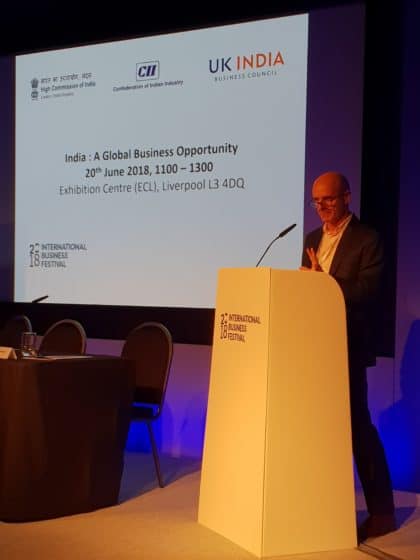Speech: ‘A New India, and a New UK-India Partnership’ by Kevin McCole
Speaking at the UKIBC's India Day event at the 2018 International Business Festival, Kevin McCole, UKIBC COO, gave his take on the future of the UK-India relationship.

Kevin McCole speaking at the UKIBC India Day event at the International Business Festival
India is Unrecognisable Today
The change in India over the last decade, particularly over the last four years under Mr Modi, has been dramatic. And there has been a similarly striking change in the UK-India relationship in that time. There are impressive macro numbers. India’s GDP has almost doubled from $1.2 trillion to $2.5 trillion since 2007. The GDP per capita has increased by around 60%. And FDI into India in 2017 was double what it was 10 years ago.
But these numbers don’t really give a sense of how the Indian economy and the lives of Indians have transformed. There are many examples of this transformation, but I will focus on only a few.
In 2007, there were 10 million mobile phone users in India. Today there are one billion. And rising. In 2007, no Indian had an ID card. Today, almost 1.2 billion Indians have a digitally-driven biometric ID card. 1.2 billion and, as the young population continues to grow, still rising. In 2007, financial inclusion rarely reached people outside of India’s cities. But, since 2014, an additional 300 million Indian’s have a bank account.
These transformations lay the foundation for a compelling, digitally-led, India. And for a strong, forward-looking UK-India partnership. I’ll return to this later.
UK-India Relations are Unrecognisable Today
So, has the UK-India partnership changed in the last decade?
Since 2007, we have seen multi-billion pound major investments in India by the likes of Vodafone, BP and Diageo. And, of course, the traffic is very much two way. Tata Steel bought Corus in 2007. And Tata Motors bought JLR in 2008. Other Indian giants, including Wipro, TCS and HCL have continued to expand their presence in the UK. Indeed, TCS alone recruit 400 UK graduates a year.
Alongside these headline-grabbers, there have been thousands upon thousands of deals done. Partnerships formed by SMEs, universities, and research institutions. The UK-India commercial relationship has gone from strength to strength.
There has also been a significantly more intense political engagement over the last 10 years. Both David Cameron and Theresa May made India their first bilateral visits. And, of course, PM Modi made hugely impactful visits in 2015 and 2018. What is most striking about these visits is that they were largely driven by a bilateral business agenda, whereas earlier visits were largely political.
The UK’s diplomatic engagement with India has also significantly strengthened. Since 2007, the Government has opened four new deputy high commissions, making India the UK’s largest diplomatic network.
The Next 10 Years – a New India
So, the last decade has seen much positive change. But where will we be 10 years from now?
According to Morgan Stanley, India will have a $6 trillion dollar economy within 10 years, making it the third largest in the world. Internet penetration in India will double in the next 10 years, meaning over 900 million Indians will be online by 2027. There were 300 million smart phone subscriptions in India last year. This will rise to 700 million in 2020.
Many more Indians will be online, and many more will be on the move. The Ahmedabad-Mumbai bullet train is due to be up and running by 2022. And, by 2025, Richard Branson will link Pune and Mumbai by Hyper-loop. And, despite this competition on the surface of the earth, more people will be travelling by air. In 2007, there were 96 million air passenger journeys in India. Last year there were about 220 million. And, by 2027, it is estimated that there will be 700 million air passenger journeys per year.
The UK-India Relationship
So, with these changes and opportunities emerging in India. And with Brexit. There will be a new dynamic in the UK-India relationship.
As the UK leaves the EU, our Government has made it clear that it wants to be an advocate of free trade. The Government has also made it clear that it wants to build a stronger economic partnership with India.
To these ends, there is excellent work under way in the Joint Trade Review, through which the Governments are examining non-tariff barriers in three shared priority areas: food and drink; life sciences and healthcare; and ICT. This Review was cited by Dr Fox as a model of excellence during the Commonwealth Heads of Government Meeting in April. And it lays the foundations for a UK-India trade deal.
While this trade policy dialogue is important, businesses can’t, and must not, wait for a trade deal before increasing engagement with India. There are tremendous opportunities across all sectors: defence; aerospace; in all things digital; energy; education; transport; healthcare; and building smart cities. Etc. etc.
It was interesting and, I think, hugely constructive that the UK-India Tech Partnership was announced when Mrs May and Mr Modi met in London in April. This Partnership brings a welcome clarity of purpose to the UK-India business relationship. It is both welcome and sensible, particularly given the was the digital economy is transforming India and the significant complementarity between the UK and India when it comes to innovation.
The initiatives announced will connect start-ups, SMEs, venture capitalists, big businesses, and universities in both countries. There will also be a pairing of innovation clusters, such as Pune and the Sheffield City Region.
By focusing on collaborative innovation, both countries are future proofing their economies — individually and together. Another win-win for the UK and India.
So, the UK-India business relationship is certainly bright. Barriers to business will reduce as a result of the trade review. And tech-rich businesses will find ever more opportunities.



